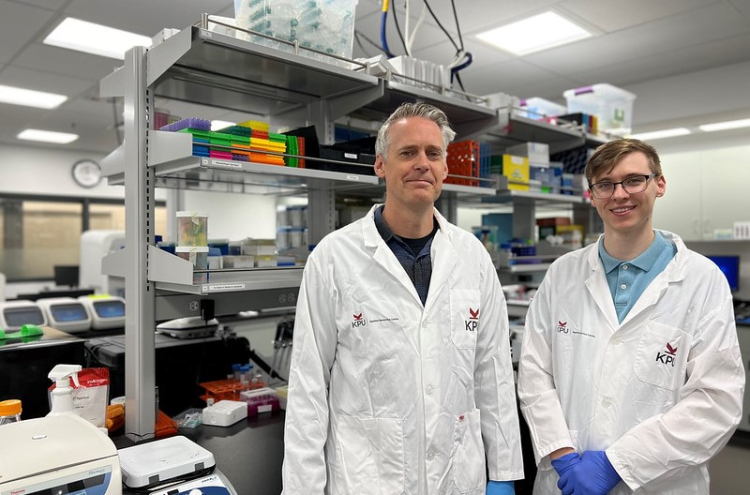Farmers and ranchers across B.C. lost more than 651,000 livestock to a deadly heat dome event in 2021. Researchers are now testing a new breed of cattle that may be able to withstand extreme heat in Canada.

Dr. Paul Adams and Robert Wester.
The new study, led collaboratively by Kwantlen Polytechnic University (KPU) and Thompson Rivers University, specifically draws on a naturally occurring gene mutation that provides cattle with a higher level of heat tolerance.
This mutation, originally found in a Caribbean breed of cattle called Senepol, results in a slick trait characterized by short and sleek hair, says Robert Wester, a graduate student who is completing his master's research at KPU's Applied Genomics Centre.
"Heat stress in cattle can result in reduced growth rates, lower fertility, poor meat quality and increased mortality rates," he says. "The slick trait is associated with superior heat tolerant capabilities so we wanted to put that into our breeds of cattle and to see how well the genetics lead to the actual trait."
To track and reproduce the slick trait in subsequent generations, Wester utilized SNP genotyping a measurement of one of the most common types of genetic variations to identify genetic markers associated with the trait. Then, using in vitro fertilization, the team selectively bred 12 cows with the slick trait, which were named the Climate Master Composite cattle.
After monitoring their respiration rates, activity levels, internal temperatures and expression of heat stress-associated genes, the cattle were found to exhibit a superior ability to mitigate heat stress.
"We think this research is a big step forward in helping farmers adapt to the impacts of global climate change and continue meeting consumer demands," says Wester. "Extreme climate events have posed significant challenges to B.C.'s beef industry, making innovative solutions necessary."
Dr. Paul Adams, Director of the Applied Genomics Centre, says the study draws on natural processes.
"We used common breeding practices to take a naturally occurring genetic variant in one breed of cattle and breed that into a second breed of cattle," he says. "By doing that, we're actually helping this second breed become more tolerant to the heat that we're starting to experience during the summers in Canada."
Wester says this research gave him the opportunity to get hands-on experience while doing meaningful work.
"I've gained a lot of experience through this project with different analysis pipelines and bioinformatics tools," he says. "It also has a real-world consequence to increase the survivability of these cattle, and I think that's important to the beef industry."
Founded in 2019, the Applied Genomics Centre at KPU is a research lab focused on developing molecular genetic and cellular product solutions for the agricultural and human health sectors. Students have the opportunity to gain critical research and development skills while engaged in projects that have a direct impact on their community.













